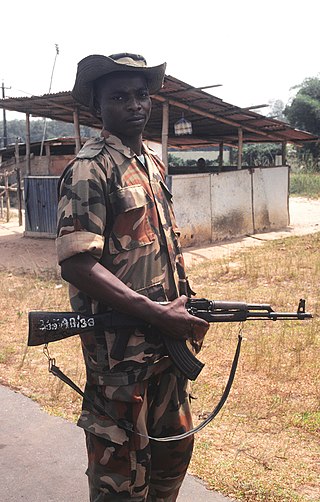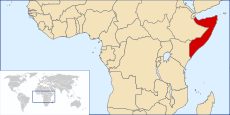
United Nations Security Council resolution 751 is a United Nations Security Council resolution adopted unanimously on 24 April 1992, after reaffirming resolutions 733 (1992) and 746 (1992) and considering a report by the Secretary-General Boutros Boutros-Ghali on the ongoing civil war in Somalia. The council established a United Nations Operation in Somalia I with an immediate deployment of 50 observers in the capital Mogadishu to monitor the ceasefire.

United Nations Security Council Resolution 1916, adopted unanimously on March 19, 2010, after recalling resolutions 733 (1992), 1519 (2003), 1558 (2004), 1587 (2004), 1630 (2005), 1676 (2006), 1724 (2006), 1744 (2007), 1766 (2007), 1772 (2007), 1801 (2008), 1811 (2008), 1844 (2008), 1853 (2008), 1862 (2009), 1894 (2009) and 1907 (2009), the Council extended the term of the Monitoring Group for 12 months and expanded its mandate to include the monitoring of the arms embargo on Eritrea in addition to Somalia.

United Nations Security Council resolution 985, adopted unanimously on 13 April 1995, after reaffirming resolutions 813 (1993), 856 (1993), 866 (1993), 911 (1994), 950 (1994) and 972 (1995), and 788 (1992) which imposed an arms embargo on Liberia, the council established a committee to monitor the implementation of the embargo and extended the mandate of the United Nations Observer Mission in Liberia (UNOMIL) until 30 June 1995.

United Nations Security Council resolution 1407, adopted unanimously on 3 May 2002, after recalling resolutions on the situation in Somalia, particularly Resolution 733 (1992), the Council requested the Secretary-General to establish a team to assess requirements for an expert panel to monitor violations of the arms embargo against the country.

United Nations Security Council resolution 1425, adopted unanimously on 22 July 2002, after recalling resolutions on the situation in Somalia, particularly resolutions 733 (1992) and 1407 (2002), the council established a panel of experts to investigate violations of the arms embargo against the country.

United Nations Security Council resolution 1474, adopted unanimously on 8 April 2003, after recalling resolutions on the situation in Somalia, particularly resolutions 733 (1992), 1407 (2002) and 1425 (2002), the council re-established a panel of experts to investigate violations of the arms embargo against the country.
United Nations Security Council resolution 1519 was adopted unanimously on 16 December 2003. After recalling resolutions on the situation in Somalia, particularly resolutions 733 (1992), 1356 (2001), 1407 (2002), 1425 (2002) and 1474 (2003), the council requested the establishment of a monitoring group to investigate violations of the arms embargo against the country.

United Nations Security Council resolution 1533, adopted unanimously on 12 March 2004, after recalling all previous resolutions on the situation in the Democratic Republic of the Congo, the council established a committee to monitor an arms embargo imposed on all foreign and Congolese forces in the east of the country.

United Nations Security Council Resolution 1950, adopted unanimously on November 23, 2010, after recalling previous resolutions on the situation in Somalia, including resolutions 1814 (2008), 1816 (2008), 1838 (2008), 1844 (2008), 1846 (2008), 1851 (2008), 1897 (2009) and 1918 (2010); the Council re-authorised states to intervene in acts of piracy by Somali pirates at sea for a further period of twelve months.

United Nations Security Council resolution 1584, adopted unanimously on 1 February 2005, after recalling resolutions 1528 (2004) and 1572 (2004) on the situation in Côte d'Ivoire, the council, acting under Chapter VII of the United Nations Charter, strengthened an arms embargo against the country.

United Nations Security Council resolution 1587, adopted unanimously on 15 March 2005, after recalling previous resolutions on the situation in Somalia, particularly resolutions 733 (1992), 1519 (2003) and 1558 (2004), the council re-established a group to monitor the arms embargo against the country for a further six months.

United Nations Security Council Resolution 1607, adopted unanimously on 21 June 2005, after recalling all previous resolutions on the situation in Liberia, the Council extended the embargo on Liberian diamonds for a further six months.

United Nations Security Council resolution 1630, adopted unanimously on 14 October 2005, after recalling previous resolutions on the situation in Somalia, particularly resolutions 733 (1992), 1519 (2003), 1558 (2004) and 1587 (2005), the council re-established a group to monitor the arms embargo against the country for a further six months and condemned the increase in flow of weapons to the country in violation of the embargo.

United Nations Security Council Resolution 1676, adopted unanimously on May 10, 2006, after recalling previous resolutions on the situation in Somalia, particularly resolutions 733 (1992), 1519 (2003), 1558 (2004), 1587 (2005) and 1630 (2006), the Council re-established a group to monitor the arms embargo against the country for a further six months.

United Nations Security Council Resolution 1724, adopted unanimously on November 29, 2006, after recalling previous resolutions on the situation in Somalia, particularly resolutions 733 (1992), 1519 (2003), 1558 (2004), 1587 (2005), 1630 (2006) and 1676 (2006), the Council re-established a group to monitor the arms embargo against the country for a further six months and condemned an increase in the flow of weapons to the country.

United Nations Security Council Resolution 2002, adopted unanimously on July 29, 2011, after recalling resolutions 733 (1992), 1519 (2003), 1558 (2004), 1587 (2004), 1630 (2005), 1676 (2006), 1724 (2006), 1744 (2007), 1766 (2007), 1772 (2007), 1801 (2008), 1811 (2008), 1844 (2008), 1853 (2008), 1862 (2009), 1907 (2009), 1916 (2010) and 1972 (2011), the Council tightened sanctions against Eritrea and Somalia to include individuals and entities recruiting or using child soldiers in the Somali Civil War, in addition to those responsible for attacks against schools and hospitals in Somalia.

United Nations Security Council Resolution 2020 was unanimously adopted on 22 November 2011.
United Nations Security Council Resolution 1766 was unanimously adopted on 23 July 2007.
United Nations Security Council Resolution 1853 was unanimously adopted on 19 December 2008.
United Nations Security Council Resolution 1811 was unanimously adopted on 29 April 2008.
















